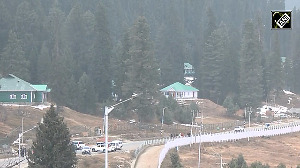India still has some way to go before it is a thriving, functional democracy, writes Pramod Kumar Buravalli
Let us be real. India is still a work in progress. It needs another 20-30 years of all-inclusive and steady socio-economic-military growth to be called a developed nation on par with other developed ones at that time.
Everybody agrees on that. But, many of us forget to include 'political' growth in that category.
Today, India is headed by a good prime minister whose economic policies in the early 1990s paved way for the growth that India is still witnessing today, albeit at a slower pace. He represents one of the oldest political parties in Asia and perhaps one of the oldest even in comparison to other parties in the democratic world. The Indian National Congress is truly an amazing confederation of local, regional, national and internationally well known leaders.
And, even the worst critics of the Congress party know that although there are many factions and tussles at the lower and middle rung of the party, the final buck stops at the matriarch of the Nehru-Gandhi dynasty; Sonia Gandhi. She has done an exceptionally good job of taking over the reins of a party that was sinking into an abyss just a decade ago. With a clear succession line in place, the Congress is looking stronger and better than ever before.
On the other side the largest Indian opposition party, the Bharatiya Janata Party is witnessing what the Congress was facing 10 years ago. Successive defeats at the 2004 and 2009 general elections, losses in many state elections that normally would have gone in favour of the BJP, a vacuum in their central leadership and extraordinary indiscipline within a normally disciplined party cadre has only made matters worse.
Unlike the Congress which is controlled by a single family, the BJP is not controlled by any single family or individual. It was founded, nurtured and firmly established as a national alternative by a slew of leaders that identified with the Rashtriya Swayamsevak Sangh school of thought. The RSS is akin to the Vatican in many ways. It is not an elected body; its sole purpose is to protect, preserve and propagate Indian culture/religions and is involved in more than 150,000 education and healthcare service projects all around the world. An organisation that is growing more rapidly than any comparable entity is truly an amazing feat by any means.
I will also have to mention the Communists here who are on the wane in the only two large states where they exert any influence. Without newer cadre and mainstream public joining them in good numbers, they are at a bigger crossroads than the BJP. And, since most of their economic and social policies are being slyly copied by the Congress leaving them nothing to preach about, they are at an ideological crossroads as well.
Some skeptics say that the BJP and the Left are in unstoppable downward spirals. I would disagree. In fact, they are just beginning to turn a corner and re-write their political philosophies.
Why do I say that? Well, India is a Hindu majority nation and as long as Hindus feel beleaguered in their own land, there will always be an issue for the BJP for raise. For a party that has close to 20 percent of the popular vote, has millions of loyal party cadres, about 1,000 elected MLAs and MPs and some very smart leaders, it is not impossible for them to find a solution to their problems.
And, India is still a socialist country in many ways and as long as there is poverty and exploitation, a red flag will flutter and the Communists will find an issue to raise.
Coming back to the Congress, some admirers may say that their party is flawless. They may say that the Congress represents all sections of the Indian public and has many able administrators and economists at the helm.
If that is the case, my question is why are they still not winning thumping majorities? A case to this point is the recent elections in Maharashtra and Haryana. They could just scrape through because of their ally (Nationalist Congress Party) in Maharashtra and with the help of some independents in Haryana. In fact, in Maharashtra they won by dividing the opposition.
Similarly, any candidate spending Rs 5 crore is able to win an MLA seat, anyone with over Rs 15 crore can win an MP seat and anyone who can bring together 5-10 MPs can easily become a minister in the Union Cabinet.
These types of victories are no victories. They can be at best called winning by default and winning at any cost.
Conclusion
For India to be called a real democracy, the Indian political system has to change and allow merit to grow. That change can only come with political and social consensus. The Congress (representing the centre left), the BJP (representing the centre right) and the Communists (representing the far left) all have an important role to play in bringing in political renaissance.
Some measures like conducting candidate debates, fixing the terms for elected representatives, having a constitutionally empowered political finance regulatory authority and effective policing of campaigns and elections by the Election Commission will go a long way in making India a truly functional and thriving democracy.
Until then, Indian democracy will continue to be at the crossroads unfortunately!





